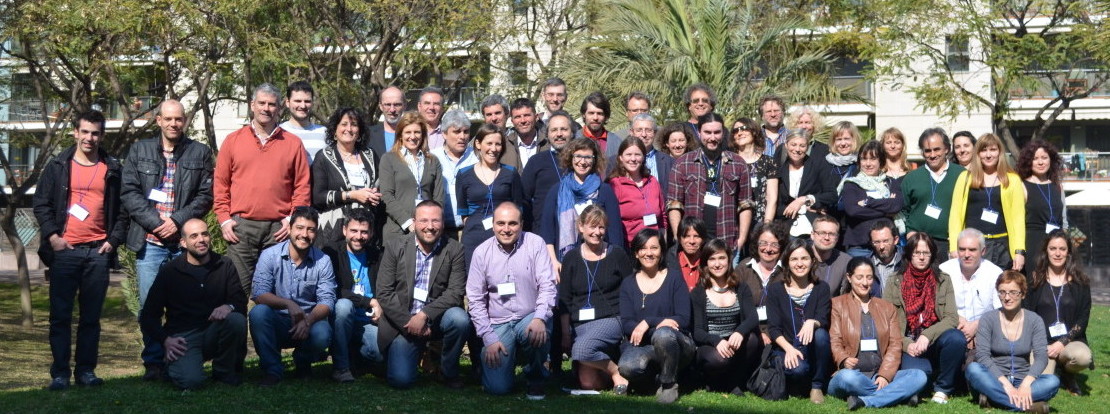CephsInAction MC & WGs meetings – Barcelona 2014
Barcelona, Spain — 14-16 March 2014
Hesperia Del Mar

Barcelona (Spain) was the seat for the second MC and Working Groups meetings of CephsInAction. The meeting was hosted at Hesperia del Mar Hotel.
More than 70 FA1301 COST Action participants (including MC members) attended the event with enthusiasm and interest.
More than 30 scientific presentations (oral and poster) were provided, thus facilitating the get-together and the beginning of networking among different researchers and stakeholders.
FA1301 Barcelona 2014 – Program
| Friday, March 14th, 2014 |
13.00 Registration and Welcome Lunch
14.00 Welcome and Introduction – G. Ponte (Italy); D. Osorio (UK)
14.15 – 17.15 Scientific Overview (Contributors listed in alphabetical order)
Nutritional physiology and stress of the first life stages of common octopus (Octopus vulgaris)
E. Almansa (Spain)
Brain and behaviour ontogenesis of the cuttlefish Sepia officinalis: impact of environmental pollution by pharmaceutical residues
C. Bellanger (France)
Optimal water quality parameters for common octopus (Octopus vulgaris) maintenance
J. Cerezo Valverde (Spain)
Common octopus culture: 10 years of research in the Aquaculture Research Group (Las Palmas, Canary Islands, Spain))
J. Estefanell (Spain)
Pathogens and immune response in common octopus (Octopus vulgaris)
C. Gestal (Spain)
Minimizing invasive procedures by controlling the task environment of the octopus
M. Kuba (Germany)
In search of Ocean Knowledge and Sustainability
R. Ozorio (Portugal)
What we do to kill an octopus (Octopus vulgaris)
J. Pereira (Portugal)
Biology of Illex coindetii (Verany, 1839) (Cephalopoda: Ommastrepidae) in the Eastern Adriatic Sea
M. Petric (Croatia)
The transcriptome as a tool for discovery the molecular secrets of Octopus vulgaris
G. Petrosino (Italy)
Study of the main factors influencing Hatchling quality in oceanic squids: maternal and environmental effects
D. Quintana (Spain)
Possible role for Serotonine and Octopamine as specific signals, during reinforcement learning, in the vertical lobe of Octopus vulgaris
T. Shomrat (Israel)
Research in European Cuttlefish Aquaculture and Welfare at CCMAR: An Overview
A. Sykes (Portugal)
Cephalopods as model in EvoDevo
A. Wanninger (Austria)
18.00 – 20.00 FA1301 Working Groups, get together
Introduction on Working Groups – G. Ponte (Italy)
WG1 – Research needs in cephalopods welfare – M. Kuba (Germany)
WG2 – Stress and diseases – C. Gestal (Spain)
WG3 – Neurophysiology, Anaesthesia and Humane end-points – T. Shomrat (Israel)
WG4 – Development of a Welfare Index – L. Stien (Norway)
WG5 – Education and Training – N. Shashar (Israel)
Companies involved in CephsInAction and their contribution
VisualSonic – D. Fuchs (Netherlands)
ABT Innovia as an R&D service provider to the industry – C. Espinal (Malta)
FA1301 Working Groups, open discussion
20.30 – 22.00 Poster Session & Dinner
| Saturday, March 15th, 2014 |
9.00 – 11.30 Cephalopods as Models and the impact of Directive 2010/63
Cephalopods as model organisms: historical and theoretical reflections
A. Dröscher (Italy)
Care and welfare of egg masses and hatchlings of cephalopods: an introduction
R. Villanueva (Spain)
Guidelines for the Care and Welfare of Cephalopods in Research. A consensus based on an initiative by CephRes, FELASA and the Boyd Group
L. D’Angelo (Italy)
Working for Cephs’ Facilities
V. Galligioni (Italy)
Round Table: Open Discussion – P. Andrews and G. Fiorito, chairs
12.00 – 12.15 CephsInAction’s Tools: STSMs and Training Schools – G. Ponte (Italy)
12.15 – 13.15 Working Groups FA1301 – Open Discussion
14.45 – 16.45 Working Groups FA1301 – Parallel Sessions
17.30 – 18.30 Working Groups FA1301
Reports and Final Discussion
| Sunday, March 16th, 2014 |
FA1301 – Management Committee Meeting
FA1301 Barcelona 2014 – Poster Presentations
| M | T | W | T | F | S | S |
|---|---|---|---|---|---|---|
| 1 | 2 | 3 | 4 | 5 | 6 | 7 |
| 8 | 9 | 10 | 11 | 12 | 13 | 14 |
| 15 | 16 | 17 | 18 | 19 | 20 | 21 |
| 22 | 23 | 24 | 25 | 26 | 27 | 28 |
| 29 | 30 | 31 | ||||
This website is supported by COST, European COoperation in Science and Technology


